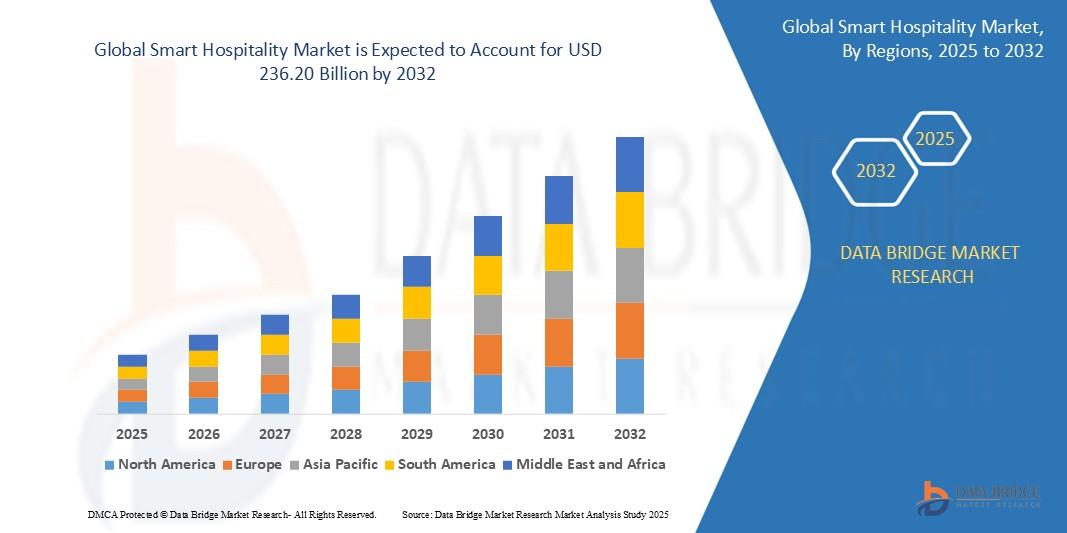Smart Hospitality Market Scope, Segmentation, and Key Insights 2025–2032

"Latest Insights on Executive Summary Smart Hospitality Market Share and Size
CAGR Value
- The global smart hospitality market size was valued at USD 36.48 billion in 2024 and is expected to reach USD 236.20 billion by 2032, at a CAGR of 26.3% during the forecast period
- This growth is driven by factors such as technological advancements, demand for personalized guest experiences, improved operational efficiency, sustainability initiatives, rising need for contactless services, and better connectivity
This Smart Hospitality Market research report proves to be true in serving the purpose of businesses of making enhanced decisions, deal with marketing of goods or services, and achieve better profitability by prioritizing market goals. This market research report deeply analyses the potential of the market with respect to current scenario and the future prospects by taking into view numerous industry aspects. The Smart Hospitality Market report explains market definition, currency and pricing, market segmentation, market overview, premium insights, key insights and company profile of the major market players. Moreover, the Smart Hospitality Market report endows with the data and information for actionable, most recent and real-time market insights which make it uncomplicated to take critical business decisions.
The Smart Hospitality Market report displays the systematic investigation of existing scenario of the market, which takes into account several market dynamics. The market report also helps to get idea about the types of consumers, their reaction and views about particular products, and their thoughts for the improvement of a product. Geographical scope of the products is also taken into consideration comprehensively for the major global areas which helps characterize strategies for the product distribution in those areas. This Smart Hospitality Market research report can be used to acquire valuable market insights in a cost-effective way.
Dive into the future of the Smart Hospitality Market with our comprehensive analysis. Download now:
https://www.databridgemarketresearch.com/reports/global-smart-hospitality-market
Smart Hospitality Business Outlook
Segments
- On the basis of component, the smart hospitality market can be segmented into software, services, and hardware. The software segment is expected to dominate the market due to the increasing adoption of software solutions to enhance operational efficiency and customer experience in the hospitality industry. Services segment is also anticipated to witness significant growth as hotels and resorts increasingly rely on service providers for implementing and managing smart solutions. The hardware segment, including devices such as smart locks, sensors, and cameras, is projected to show steady growth with the rising demand for IoT-enabled solutions in the hospitality sector.
- By hotel type, the market can be divided into business hotels, leisure hotels, and resorts. Business hotels are expected to lead the market share as they prioritize technology integration to streamline operations and offer personalized services to business travelers. Leisure hotels and resorts are also adopting smart hospitality solutions to improve guest satisfaction and loyalty through enhanced experiences and amenities.
- Based on deployment model, the smart hospitality market includes on-premises and cloud-based deployment. The cloud-based deployment model is gaining traction in the industry due to its scalability, flexibility, and cost-effectiveness. Cloud solutions enable hotels to access real-time data, streamline processes, and offer personalized services to guests, driving the market growth for this segment.
Market Players
- Some of the key players operating in the global smart hospitality market are Cisco Systems, Inc., Huawei Technologies Co., Ltd., IBM Corporation, NEC Corporation, Siemens AG, Schneider Electric, Infor, Inc., Honeywell International Inc., Johnson Controls, and Mitel Networks Corp. These market players are focusing on strategic partnerships, acquisitions, and product innovations to gain a competitive edge in the smart hospitality market. With the increasing demand for connected technologies in the hospitality sector, these companies are investing in R&D to develop advanced solutions that cater to the evolving needs of hotels and resorts worldwide.
The current landscape of the smart hospitality market showcases a dynamic ecosystem driven by the convergence of technological advancements and the evolving needs of the hospitality industry. Beyond the traditional segmentation parameters such as components, hotel types, and deployment models, there are emerging trends and factors influencing the market trajectory. One notable trend is the emphasis on sustainability and eco-friendly practices within smart hospitality solutions. Hoteliers are increasingly adopting technologies that not only enhance guest experiences but also promote environmental conservation and energy efficiency. This shift towards sustainable practices aligns with the growing consumer preference for eco-conscious accommodation options, setting a new benchmark for smart hospitality providers.
Moreover, the integration of artificial intelligence (AI) and data analytics is reshaping how hotels leverage smart technologies to personalize guest interactions and optimize operational efficiency. AI-powered chatbots, smart room assistants, and predictive analytics tools are revolutionizing customer service and management processes, offering a seamless and proactive approach to guest satisfaction. By harnessing the power of data-driven insights, hotels can anticipate guest preferences, streamline service delivery, and make informed business decisions in real-time, thereby enhancing overall competitiveness and revenue generation.
Another significant aspect influencing the smart hospitality market is the rise of contactless technologies in response to the COVID-19 pandemic. Contactless check-ins, digital key solutions, touchless payments, and remote control options have become imperative features for ensuring guest safety and minimizing physical interactions. As hygiene and health protocols continue to shape the hospitality landscape, the integration of contactless technologies provides a dual benefit of enhancing guest confidence while improving operational efficiency for hoteliers.
Furthermore, the concept of experiential hospitality is gaining traction as hotels seek to differentiate themselves in a competitive market. Beyond providing basic amenities, smart hospitality solutions are increasingly focusing on creating immersive and personalized experiences for guests. From augmented reality (AR) tours and virtual concierge services to IoT-enabled smart rooms tailored to individual preferences, hotels are reimagining guest engagement through innovative tech-driven initiatives. By curating memorable experiences that resonate with guests on a deeper level, smart hospitality providers can foster greater customer loyalty and advocacy, ultimately driving long-term business success.
In conclusion, the smart hospitality market is undergoing a paradigm shift characterized by a blend of technological innovation, sustainability imperatives, data-driven insights, contactless solutions, and experiential offerings. As market players continue to collaborate, innovate, and adapt to evolving industry trends, the future of smart hospitality holds immense potential for transforming the guest experience, optimizing operations, and unlocking new avenues for growth and differentiation in the competitive landscape.The smart hospitality market is witnessing a significant transformation driven by technological advancements and changing consumer preferences. One emerging trend that is shaping the market landscape is the increasing emphasis on sustainability and eco-friendly practices within smart hospitality solutions. Hotels and resorts are incorporating technologies that not only enhance guest experiences but also promote environmental conservation and energy efficiency. This shift towards sustainable practices aligns with the growing consumer demand for eco-conscious accommodation options, indicating a shift towards more environmentally responsible hospitality practices.
Additionally, the integration of artificial intelligence (AI) and data analytics is revolutionizing how hotels utilize smart technologies to personalize guest interactions and optimize operational efficiency. AI-powered chatbots, smart room assistants, and predictive analytics tools are enhancing customer service and management processes, offering a seamless and proactive approach to guest satisfaction. By leveraging data-driven insights, hotels can anticipate guest preferences, streamline service delivery, and make informed business decisions in real-time, ultimately enhancing competitiveness and revenue generation in the market.
Moreover, the COVID-19 pandemic has accelerated the adoption of contactless technologies in the hospitality industry. Contactless check-ins, digital key solutions, touchless payments, and remote control options have become essential features for ensuring guest safety and reducing physical interactions. As hygiene and health protocols continue to influence the hospitality sector, the integration of contactless technologies not only enhances guest confidence but also improves operational efficiency for hoteliers, driving the need for seamless and secure contactless solutions in the market.
Furthermore, the concept of experiential hospitality is gaining momentum as hotels strive to differentiate themselves in a competitive market. Smart hospitality solutions are moving beyond providing basic amenities and are focusing on creating immersive and personalized experiences for guests. From augmented reality (AR) tours to IoT-enabled smart rooms customized to individual preferences, hotels are redefining guest engagement through innovative tech-driven initiatives. By curating memorable experiences that resonate with guests on a deeper level, smart hospitality providers can foster greater customer loyalty and advocacy, ultimately driving sustained business success and setting new benchmarks for guest satisfaction in the market.
In conclusion, the smart hospitality market is evolving to meet the changing demands of consumers and the industry landscape. By embracing sustainability, leveraging AI and data analytics, implementing contactless technologies, and offering experiential hospitality, market players can differentiate themselves, enhance guest experiences, and drive growth in a competitive environment. The future of smart hospitality lies in the innovative integration of technology, sustainability practices, and personalized experiences to create a new standard of service excellence in the industry.
Analyze detailed figures on the company’s market share
https://www.databridgemarketresearch.com/reports/global-smart-hospitality-market/companies
Smart Hospitality Market – Analyst-Ready Question Batches
- What is the current demand volume of the Smart Hospitality Market?
- How is the market for Smart Hospitality expected to evolve in the next decade?
- What segmentation criteria are applied in the Smart Hospitality Market study?
- Which players have the highest market share in the Smart Hospitality Market?
- What regions are assessed in the country-level analysisfor Smart Hospitality Market?
- Who are the top-performing companies in the Smart Hospitality Market?
Browse More Reports:
About Data Bridge Market Research:
An absolute way to forecast what the future holds is to comprehend the trend today!
Data Bridge Market Research set forth itself as an unconventional and neoteric market research and consulting firm with an unparalleled level of resilience and integrated approaches. We are determined to unearth the best market opportunities and foster efficient information for your business to thrive in the market. Data Bridge endeavors to provide appropriate solutions to the complex business challenges and initiates an effortless decision-making process. Data Bridge is an aftermath of sheer wisdom and experience which was formulated and framed in the year 2015 in Pune.
Contact Us:
Data Bridge Market Research
US: +1 614 591 3140
UK: +44 845 154 9652
APAC : +653 1251 975
Email:- corporatesales@databridgemarketresearch.com
"
- Art
- Causes
- Crafts
- Dance
- Drinks
- Film
- Fitness
- Food
- Games
- Gardening
- Health
- Home
- Literature
- Music
- Networking
- Other
- Party
- Religion
- Shopping
- Sports
- Theater
- Wellness


